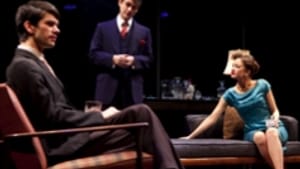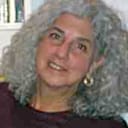Stay in the Loop
BSR publishes on a weekly schedule, with an email newsletter every Wednesday and Thursday morning. There’s no paywall, and subscribing is always free.
Gay anguish, then and now
Campbell's "The Pride,' off-Broadway

"Do you believe in change?" This is the central and ambiguous question of The Pride, currently having its U.S. premiere Off-Broadway following its London success. The answer seems to be that times change but people don't.
The times are two: 1958 and 2008. The individuals are three, times two: Oliver (Ben Whishaw), a homosexual writer whose sexuality is a source of suffering in 1958; and Oliver (also Ben Whishaw), a contemporary gay man whose sexuality is a source of suffering for him and for anyone he cares for, since his erotic escapades are indiscriminate and obsessive. Oliver's refrain—then as well as now— is "I'm sorry. I'm so sorry."
Both Olivers fall in love with two Philips (played by Hugh Dancy). The 1958 Philip is married and so deeply closeted that once he acts on his attraction to Oliver he enters a gruesome aversion therapy to "cure" himself. Contemporary Philip is openly gay but struggling as well— with his longtime lover Oliver's philanderings.
1958 Philip is married to 1958 Sylvia (Andrea Riseborough), a fragile, sensitive woman resigned to loneliness and childlessness, intuiting but never speaking of her husband's repressed nature. Contemporary Sylvia is Oliver's best friend, a "fag hag" being smothered by his needy selfishness.
Through a looking glass
The characters slide from time frame to time frame with odd and unsettling fluidity, aided by director Joe Mantello's splendid use of David Zinn's elegant set. Sometimes the gleaming black glass behind the stage is opaque, so it reflects the people onstage, suggesting not only their dual roles but also their hidden natures. At other times it's translucent, so a 1958 character is visible behind the 2008 person. The Noel Cowardish living room of 1958 slides into the messier contemporary spaces, providing some sense of loss as well as gain: sleek sophistication vs. too-revealing torn clothing and Gay Pride parade balloons.
How significant is this change over the past half-century? That's the interesting point here. The openness of today's gay world was unimaginable in 1958— as was its vulgarity. Campbell seems to suggest that it's never easy to be homosexual. Surprisingly, his 1958 characters are far better developed— more interesting, complex portraits— than Campbell's stereotypical contemporary threesome, who talk mostly in smart remarks and one-liners.
A delicate sadness
Andrea Riseborough gives a lovely and nuanced performance as the Sylvias, conveying especially in each role the delicate sadness of a woman who loves a man who can never love her adequately, and who instinctively and self-defeatingly introduces the man she loves to the man he will love.
Thin, intense Ben Whishaw (known to film-goers as, most recently, the Keats in Bright Star) makes remarkably subtle shifts from modest and self-denigrating to self-indulgent and self-flagellating. As Philip, Hugh Dancy manages to be both pompous and heartbreakingly uptight, although contemporary Philip seems little more than a necessary plot device.
Adam James wonderfully plays a variety of roles, including a hilarious sex worker dressed as a Nazi— all costumes and role-playing, life as theater.
"'Whom you really were'
The Pride is a deeply engrossing play enlivened by four fine actors but marred by too much speechifying— especially by Oliver, whose philosophic sensitivity wears very thin. In a recent interview, Campbell said he " never really felt represented" by the gay scene. "I started exploring the idea that there were ways of behaving perhaps that had been learned or acquired and that weren't always representative of whom you really were," he added.
And so Campbell seems to have written a play about people who have acquired all those behaviors and those styles that disguised themselves from themselves. As Sylvia observes, "Life becomes like a fancy dress party and it becomes unbearable."
The times are two: 1958 and 2008. The individuals are three, times two: Oliver (Ben Whishaw), a homosexual writer whose sexuality is a source of suffering in 1958; and Oliver (also Ben Whishaw), a contemporary gay man whose sexuality is a source of suffering for him and for anyone he cares for, since his erotic escapades are indiscriminate and obsessive. Oliver's refrain—then as well as now— is "I'm sorry. I'm so sorry."
Both Olivers fall in love with two Philips (played by Hugh Dancy). The 1958 Philip is married and so deeply closeted that once he acts on his attraction to Oliver he enters a gruesome aversion therapy to "cure" himself. Contemporary Philip is openly gay but struggling as well— with his longtime lover Oliver's philanderings.
1958 Philip is married to 1958 Sylvia (Andrea Riseborough), a fragile, sensitive woman resigned to loneliness and childlessness, intuiting but never speaking of her husband's repressed nature. Contemporary Sylvia is Oliver's best friend, a "fag hag" being smothered by his needy selfishness.
Through a looking glass
The characters slide from time frame to time frame with odd and unsettling fluidity, aided by director Joe Mantello's splendid use of David Zinn's elegant set. Sometimes the gleaming black glass behind the stage is opaque, so it reflects the people onstage, suggesting not only their dual roles but also their hidden natures. At other times it's translucent, so a 1958 character is visible behind the 2008 person. The Noel Cowardish living room of 1958 slides into the messier contemporary spaces, providing some sense of loss as well as gain: sleek sophistication vs. too-revealing torn clothing and Gay Pride parade balloons.
How significant is this change over the past half-century? That's the interesting point here. The openness of today's gay world was unimaginable in 1958— as was its vulgarity. Campbell seems to suggest that it's never easy to be homosexual. Surprisingly, his 1958 characters are far better developed— more interesting, complex portraits— than Campbell's stereotypical contemporary threesome, who talk mostly in smart remarks and one-liners.
A delicate sadness
Andrea Riseborough gives a lovely and nuanced performance as the Sylvias, conveying especially in each role the delicate sadness of a woman who loves a man who can never love her adequately, and who instinctively and self-defeatingly introduces the man she loves to the man he will love.
Thin, intense Ben Whishaw (known to film-goers as, most recently, the Keats in Bright Star) makes remarkably subtle shifts from modest and self-denigrating to self-indulgent and self-flagellating. As Philip, Hugh Dancy manages to be both pompous and heartbreakingly uptight, although contemporary Philip seems little more than a necessary plot device.
Adam James wonderfully plays a variety of roles, including a hilarious sex worker dressed as a Nazi— all costumes and role-playing, life as theater.
"'Whom you really were'
The Pride is a deeply engrossing play enlivened by four fine actors but marred by too much speechifying— especially by Oliver, whose philosophic sensitivity wears very thin. In a recent interview, Campbell said he " never really felt represented" by the gay scene. "I started exploring the idea that there were ways of behaving perhaps that had been learned or acquired and that weren't always representative of whom you really were," he added.
And so Campbell seems to have written a play about people who have acquired all those behaviors and those styles that disguised themselves from themselves. As Sylvia observes, "Life becomes like a fancy dress party and it becomes unbearable."
What, When, Where
The Pride. By Alexi Kaye Campbell; directed by Joe Mantello. Open run at the Lucille Lortel Theatre, 121 Christopher St. (Greenwich Village), New York. (212) 279-4200 or www.ticketcentral.com.
Sign up for our newsletter
All of the week's new articles, all in one place. Sign up for the free weekly BSR newsletters, and don't miss a conversation.

 Toby Zinman
Toby Zinman